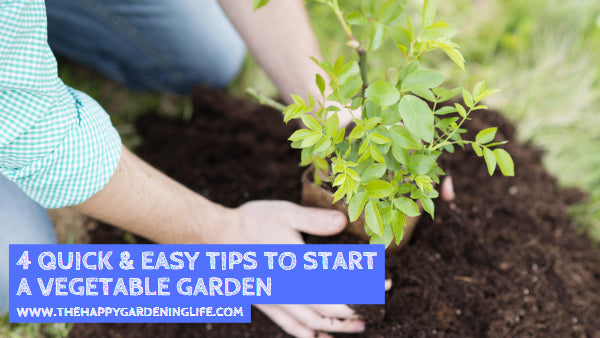
4 Quick & Easy Tips to Start a Vegetable Garden
Share
 Nervous about starting your very first vegetable garden? Don’t be stressed about it! Here are some important beginner tips that you can do to achieve gardening success.
Nervous about starting your very first vegetable garden? Don’t be stressed about it! Here are some important beginner tips that you can do to achieve gardening success.
First off, study and know the climate in your area. Bear in mind that not all vegetables grow in the same temperatures. For example, lettuce plants prefer to be raised in areas with cool temperatures while peppers like warm temperatures. So take the time to learn what kind of vegetables are suitable for your given location.
Secondly, do some planning. It’s really important to have a basic plan especially for your garden’s layout. This will enable you to maximize space and grow vegetables more effectively.
Lastly, consider the soil quality. Vegetable plants will be able to grow well when the soil is in good condition. Good soil can be obtained by adding organic fertilizers and compost. They are essential in providing the nutrients that your plants need for development.
For more info, check out the following tips for starting a vegetable garden. Feel free to share this blog post on your favorite social networking sites!
How to Start a Vegetable Garden in 4 Simple Ways
1. Assess Climate in Your Area Before Starting a Vegetable Garden
Your local climate will dictate which vegetable plants you can successfully grow in your garden, as well as when to plant them. Very hardy vegetable plants will do well in cooler climates, but tender plants must be grown in warm weather only — frost will damage or destroy these delicate plants. Familiarize yourself with your local first and last frost average dates before you choose which vegetables to plant in your garden.
2. Designing a Vegetable Garden
Plotting out your garden on paper before planting will help you visualize your space and use it effectively and efficiently. You can use graph paper to make a scale map of your garden and decide on a layout for your vegetables.
3. Garden Soil
Vegetable garden soil should ideally be a mix of air and solids, including clay, silt, and loam. If the mix isn’t just right, or if your soil is lacking in nutrients, you’ll want to add fertilizers and organic matter to your garden soil. A garden soil test report can help you determine your soil’s needs.
4. Composting
Compost piles provide excellent nutrients for your garden soil, and they give you a place to discard your kitchen waste. Start your compost pile with a base material such as leaves, grass clippings, or sawdust; add your organic garden and kitchen waste, and let the magic of the compost pile take over.
Article Source: home.howstuffworks.com
